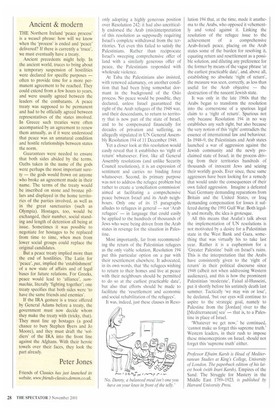Ancient & modern
THE Northern Ireland 'peace process' is a weasel phrase: how will we know when the 'process' is ended and 'peace' delivered? If there is currently a 'truce', we must eventually have a treaty.
Ancient precedents might help. In the ancient world, truces to bring about a temporary suspension of hostilities were declared for specific purposes — often to provide time for a more permanent agreement to be reached. They could extend from a few hours to years, and were usually agreed between the leaders of the combatants. A peace treaty was supposed to be permanent and had to be officially agreed between representatives of the states involved. In Greece such treaties were often accompanied by an agreement to renew them annually, as if it were understood that peace was an unnatural condition and hostile relationships between states the norm.
Guarantees were needed to ensure that both sides abided by the terms. Oaths taken in the name of the gods were perhaps the most important surety — the gods would frown on anyone who broke an agreement made in their name. The terms of the treaty would be inscribed on stone and bronze pillars and displayed in the home territories of the parties involved, as well as in the great sanctuaries (such as Olympia). Hostages, too, would be exchanged, their number, social standing and length of detention all being at issue. Sometimes it was possible to negotiate for hostages to be replaced from time to time, when men from lower social groups could replace the original candidates.
But a peace treaty implied more than the end of hostilities. The Latin for 'peace', pax, implied the 'establishment' of a new state of affairs and of legal bases for future relations. For Greeks, peace would lead to 'alliance', summachia, literally 'fighting together'; one treaty specifies that both sides were 'to have the same friends and enemies'.
If the IRA gesture is a truce offered by General Adams before a treaty, the government must now decide whom they make the treaty with (tricky, that). They must line up hostages (a good chance to bury Stephen Byers and Jo Moore), and they must draft the 'soldiers' of the IRA into the front line against the Afghans. With their heroic towels over their faces, they look the part already.
Peter Jones
Friends of Classics has just launched its website, www.friends-classics.demon.co.uk


















































































 Previous page
Previous page